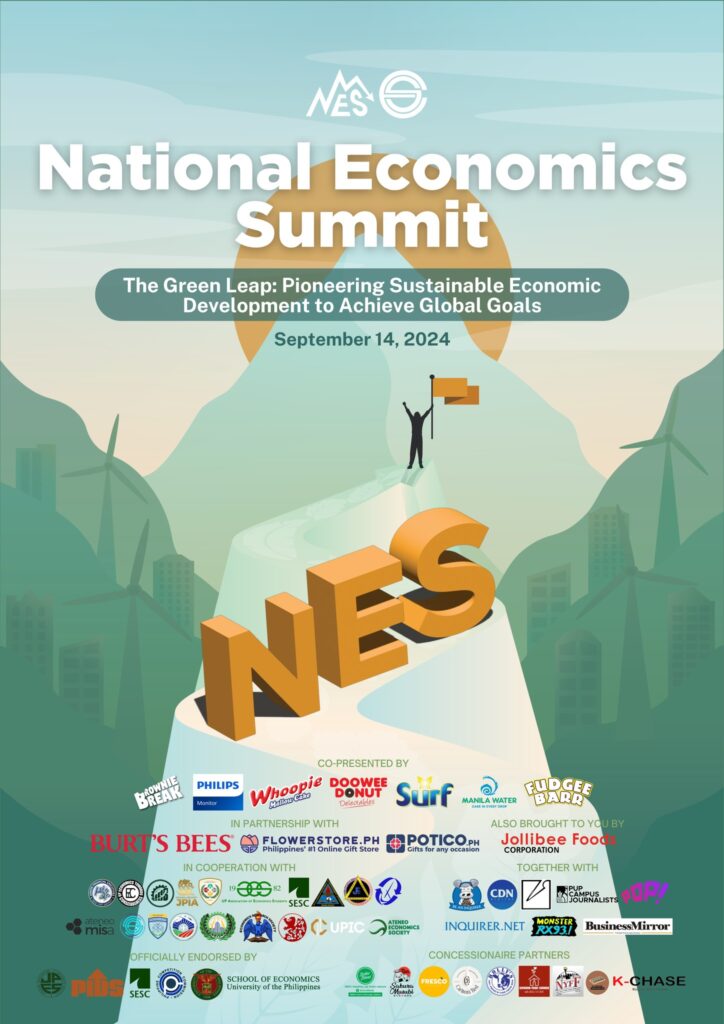On September 14, 2024, the National Economics Summit (NES) successfully concluded its largest iteration since the pandemic. Held at the UP Institute of Biology Auditorium, this year’s summit was themed “The Green Leap: Pioneering Sustainable Economic Development to Achieve Global Goals.” With over XX participants from senior high schools and universities nationwide, the summit ignited meaningful discussions on the Philippines’ critical role in advancing the United Nations Sustainable Development Goals (SDGs) and the country’s contribution to achieving the 2030 agenda.
In June 2024, the Philippines ranked 92nd out of 167 countries in terms of progress toward achieving the Sustainable Development Goals (SDGs). While this rank may not initially seem impressive, it marks a significant improvement, with the country moving up six places from previous reports. To sustain and accelerate this progress, it is essential for various sectors and institutions to actively contribute to the national efforts to meet all 17 SDGs.
All these goals contribute to economic development as they strive for an equitable and holistically prosperous society – where development puts people first. That is why for the 14th NES, the UP Economics Society placed the SDGs at the forefront through plenaries and information sessions that reintroduce the strides made and those that can be taken to bringforth sustainability at all levels.
To kickstart the event, a plenary session entitled “The Road Ahead: Shaping the Nation’s Future through the PDP” was discussed by National Economics Development Authority Assistant Secretary Renaldo Cancio. Here, Asec Cancio introduced the Philippine Development Plan and its intersections with the longstanding goals of the UN. Focus is placed on establishing robust good governance systems to ensure that political cycles do not interfere with the country’s long-term progress. Following this, a three-part information session series delved into key industries in the Philippines, highlighting the initiatives various institutions and programs are undertaking.
Assistant Director Armida Andres led the first session, “The Blue Frontier: Navigating the Economic Impact of Maritime Affairs,” which focused on ocean and environmental security. She was joined by Dr. Roehl Briones for the second session, “The Seeds for Harvest: Integrating the Plight of Filipino Farmers for Food and Agricultural Security.” Dr. Briones examined Agrarian Reform and recent government initiatives, such as the Rice Tariffication Law, to assess their successes and shortcomings. The final session, “The Nation’s Spark: Enhancing Clean Energy Efforts in the Philippines,” featured Mr. Alexander Ablaza. This discussion challenged the misconception that renewable energy is the sole component of clean energy, emphasizing the critical importance of energy efficiency in reducing environmental impact. All three speakers joined forces in a panel discussion to understand the intersections of these sectors.
The summit concluded with the annual NES Case Competition where participants are challenged to conduct a situational analysis and project proposal about the prompt. This year, emphasis was placed on the worsening conditions of Philippine marine ecosystems and their impact on the blue economy. After fierce competition, the Southridge Multipliers were hailed as the champions, followed by 1st and 2nd runners-up, UPV Oecon and UPLB Ricardian Dalisay.
Watch out for the next iteration of the National Economics Summit by following NES on Facebook, Instagram, and LinkedIn. On to the next summit!
This event was made possible by UP Economics Society.
